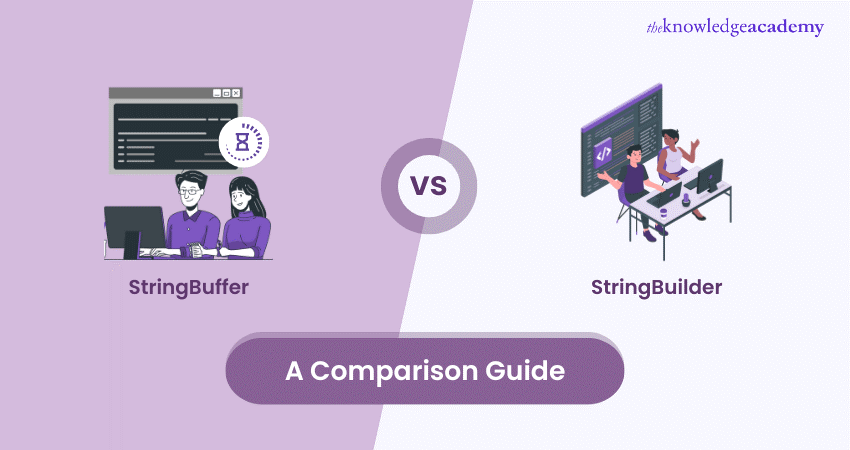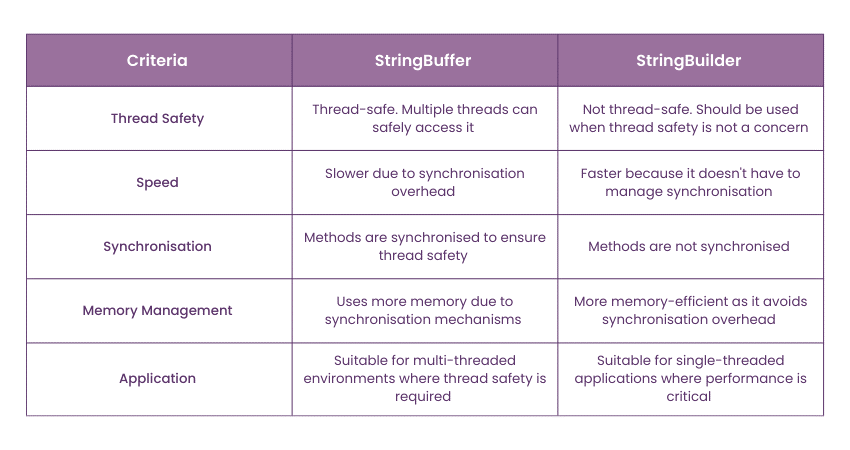We may not have the course you’re looking for. If you enquire or give us a call on + 1-866 272 8822 and speak to our training experts, we may still be able to help with your training requirements.
Training Outcomes Within Your Budget!
We ensure quality, budget-alignment, and timely delivery by our expert instructors.

Let's assume a situation where you’re developing a high-performance Java application that processes real-time data. But you notice a lag and wonder if your choice of string manipulation class is to blame. Given this situation, you might be wondering how thread safety impacts your code. Or why might one class be faster than the other? Under such circumstances, understanding the Difference Between StringBuffer and StringBuilder can be the key to unlocking better performance.
In this blog, we’ll delve into their performance applications and unique use cases. By learning the Difference Between StringBuffer and StringBuilder, you’ll know which class to use for your specific needs. Let’s dive in and unravel the intricacies of these two powerful classes!
Table of Contents
1) What is StringBuffer?
2) What is StringBuilder?
3) Difference Between StringBuffer and StringBuilder
a) Thread Safety
b) Speed
c) Synchronisation
d) Memory Management
e) Application
4) Conclusion
What is StringBuffer?
StringBuffer is a companion class to String that provides similar functionality. While String defines immutable character sequences with a fixed length, StringBuffer allows for mutable, growable character sequences. However, it’s important to note that StringBuffer can include characters and substrings. To create a string buffer, you need to construct an object.
|
StringBuffer str = new StringBuffer(); |
Use Cases of StringBuffer
StringBuffer is a robust class in Java designed for safe string manipulation in multi-threaded environments. Below are some common use cases for StringBuffer:
a) Multi-threaded Environments: Suitable for applications with multiple threads accessing and modifying the same string due to its thread safety.
b) Frequent String Modifications: Efficient for logging systems or text editors where strings are frequently changed.
c) Building Long Strings: Ideal for constructing long strings from smaller parts, such as Hypertext Markup Language (HTML) documents or Structured Query Language (SQL) queries.
d) File Input/Output (I/O) Operations: Useful for accumulating data before writing to a file, reducing the number of I/O operations.
e) Database Query Construction: Efficient for building dynamic SQL queries based on user input or other factors.
f) Web Content Generation: Suitable for generating dynamic web content like HTML pages or Extensible Markup language (XML) documents.
What is StringBuilder?
In Java, StringBuilder represents a mutable sequence of characters. Unlike the String class, which creates an immutable sequence, StringBuilder offers a flexible alternative by allowing modifications to the character sequence.
|
StringBuilder str = new StringBuilder(); |
Use Cases of StringBuilder
StringBuilder is particularly useful in scenarios where performance and Memory Management are critical. Below are some common use cases for StringBuilder:
a) Building Dynamic Strings: Ideal for constructing dynamic strings efficiently, such as complex SQL queries or HTML content.
b) Single-threaded Environments: Best for single-threaded applications where thread safety is not a concern.
c) Frequent Modifications: Efficient for applications requiring frequent string changes, like text editors or logging systems.
d) Performance-critical Applications: Preferred for performance-critical applications due to lack of synchronisation overhead.
e) Memory Management: Manages memory efficiently by dynamically resizing its internal character array.
f) Batch Processing: Useful for accumulating results in large batch processing before writing or displaying them.
Kickstart your coding journey by signing up for our JavaScript for Beginners Course now!
Difference Between StringBuffer and StringBuilder
When working with strings in Java, choosing between StringBuffer and StringBuilder can significantly impact the performance and behaviour of your application. Both classes provide similar functionality but differ in several key aspects. Let's explore their differences:

1) Thread Safety
StringBuffer is thread-safe, meaning it is synchronised and can be safely used in a multi-threaded environment. On the other hand, StringBuilder is not thread-safe, as it does not provide synchronisation. This makes StringBuilder unsuitable for use in multi-threaded environments where thread safety is a concern.
2) Speed
Due to the lack of synchronisation, StringBuilder is faster than StringBuffer. The absence of thread safety mechanisms allows StringBuilder to perform operations more quickly, making it the preferred choice for single-threaded applications.
3) Synchronisation
StringBuffer methods are synchronised, ensuring that only one thread can access the object at a time. This synchronisation guarantees thread safety but comes at the cost of performance. StringBuilder methods, however, are not synchronised, which enhances performance but sacrifices thread safety.
4) Memory Management
StringBuffer and StringBuilder both manage memory efficiently by dynamically resizing their internal character arrays as needed. However, due to the lack of synchronisation, StringBuilder can be more memory efficient in single-threaded scenarios.
5) Application
StringBuffer is typically used in applications where thread safety is required, such as in multi-threaded environments. StringBuilder, on the other hand, is used in single-threaded applications where performance is critical and thread safety is not a concern.
Build interactive and user-friendly interfaces by registering for our Java Swing Development Training today!
Conclusion
Understanding the Difference Between StringBuffer and StringBuilder is crucial for optimising your Java applications. If thread safety is essential, StringBuffer is the right choice. For single-threaded, performance-critical tasks, StringBuilder excels. By leveraging the appropriate class, you can ensure your code is efficient and effective.
Register for our Java Courses today and unlock endless possibilities - book your spot now!
Frequently Asked Questions

The alternative to StringBuffer is StringBuilder, which is faster and more efficient for single-threaded environments since it doesn't require synchronisation.

Internally, StringBuffer uses a resizable array to store characters. When modified, it synchronises methods to ensure thread safety, preventing data corruption in multi-threaded applications.

The Knowledge Academy takes global learning to new heights, offering over 30,000 online courses across 490+ locations in 220 countries. This expansive reach ensures accessibility and convenience for learners worldwide.
Alongside our diverse Online Course Catalogue, encompassing 19 major categories, we go the extra mile by providing a plethora of free educational Online Resources like News updates, Blogs, videos, webinars, and interview questions. Tailoring learning experiences further, professionals can maximise value with customisable Course Bundles of TKA.

The Knowledge Academy’s Knowledge Pass, a prepaid voucher, adds another layer of flexibility, allowing course bookings over a 12-month period. Join us on a journey where education knows no bounds.

The Knowledge Academy offers various Java Courses, including the Java Programming Course, JavaScript for Beginners Course, and Java Swing Development Training. These courses cater to different skill levels, providing comprehensive insights into Java Method Server.
Our Programming & DevOps Blogs cover a range of topics related to Java Programming, offering valuable resources, best practices, and industry insights. Whether you are a beginner or looking to advance your Programming and DevOps skills, The Knowledge Academy's diverse courses and informative blogs have got you covered.
Upcoming Programming & DevOps Resources Batches & Dates
Date
 Java Programming
Java Programming
Mon 4th Nov 2024
Mon 18th Nov 2024
Mon 13th Jan 2025
Mon 10th Mar 2025
Mon 19th May 2025
Mon 21st Jul 2025
Mon 15th Sep 2025
Mon 17th Nov 2025
Mon 15th Dec 2025







 Top Rated Course
Top Rated Course



 If you wish to make any changes to your course, please
If you wish to make any changes to your course, please


